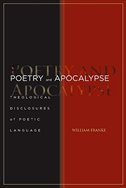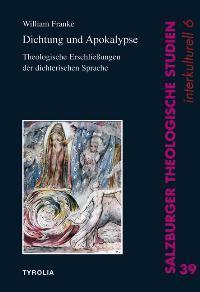Poetry and Apocalypse: Theological Disclosures of Poetic Language
Stanford University Press, 2009
reviews, excerpts, etc.
selections at: Google Books
Poetry and Apocalypse offers an interdisciplinary synthesis, combining a philosophical theory of dialogue, a literary-critical interpretation of poetic language in the apocalyptic tradition, and a negative theology that renews certain fundamental impulses and insights of revealed religion. It is concerned with finding the premises for dialogue between cultures, especially between religious fundamentalisms, like the Islamic, and modern Western secularism. The thesis is that dialogue in general, in order to be genuinely open, needs to be able to open up to such a possibility as religious apocalypse in ways that can be understood best through the experience of poetry. The book interprets the Christian epic and prophetic tradition as a secularization of religious revelation that nevertheless preserves an understanding of the essentially apocalyptic character of truth and its disclosure in history. The usually neglected negative theology that undergirds this apocalyptic tradition provides the key to a radically new and open understanding of apocalypse as inextricably religious and poetic at the same time.
Reviewed by:
Joel Harter, Journal of Religion 90 (2010): 104-106 (pdf version)
Dorothy Z. Baker, Comparative Literature Studies 46/4 (2009): 674-676
Lee A. Jacobus, James Joyce Quarterly 46/3-4 (2009): 624-627 In Project Muse
Larry D. Bouchard, Religion and Literature 43/3 (2011): 249-52 (pdf) J. H. Sims, CHOICE: Current Reviews for Academic Libraries 46.9 (May 2009): p1679.
“Franke’s theory of poetic language as negative theology is persuasive and helpful in illuminating the complex relationship between religion and literature.”—Joel Harter, The Journal of Religion
“The book’s stated objective is ‘a postmodern negative theology of poetic language’ (ix) that is both theoretical and practical, contributing to both literary theory and theology and promoting peace through radical openness to dialogue, and it is to Franke’s credit that the result is both challenging and accessible.”—Joel Harter, The Journal of Religion
“Poetry and Apocalypse: Theological Disclosures of Poetic Language is a profound and radical study that holds many surprises. . . .” Dorothy Z. Baker, Comparative Literature Studies
” . . . a performed negative theology. At such wakes and festivals, it is the praxis of recursiveconversations—Poetry and Apocalypse being an excellent example—that disclose, indirectly, possibilities of transcendent openness.”—Larry D. Bouchard, Religion and Literature
“Poetry and Apocalypse will appeal to critics who credit a Christian interpretation of Joyce’s texts in part because its premises are carefully argued and theoretically balanced.” —Lee A. Jacobus, James Joyce Quarterly
Translation into German by Michael Sonntag and Ursula Liebing:
Dichtung und Apokalypse:
Theologische Erschliessungen der dichterischen Sprache
Aus dem Amerikanischen von Ursula Liebing und Michael Sonntag
Salzburger Theologische Studien Band 39
University of Salzburg Studies in Theology, vol. 39 (Intercultural 6)
Insbruck: Tyrolia Press, 2011
ISBN 978-3-7022-3050-0
(216 pages)
Dichtung und Apokalypse sucht nach den Prämissen eines Dialogs zwischen den Kulturen, insbesondere zwischen religiös-fundamentalistischen und modern-säkularistischen Haltungen. Die These ist, dass Dialog generell, um wirklich offen zu sein, sich für die Möglichkeit der religiösen Apokalypse öffnen muss. Eine solche Möglichkeit lässt sich am besten über die dichterische Erfahrung verstehen. In diesem Sinne wird die christliche Epik in die Tradition der prophetischen Überlieferung eingebunden und als eine Säkularisierung der theologischen Offenbarung ausgelegt. Ihre Sichtweise besteht dennoch auf dem wesentlich apokalyptischen Charakter von Wahrheit und ihrer Erschließung im Laufe der Geschichte. Die oft vernachlässigte Negative Theologie, die dieser apokalyptischen Überlieferung zu Grunde liegt, bietet den Schlüssel für ein neues und offenes Verständnis von Apokalypse in ihrer stets zugleich dichterischen wie religiösen Natur.
WILLIAM FRANKE ist Professor für Vergleichende Literaturwissenschaft und für Religionswissenschaften an der Vanderbilt University in Tenessee / USA. Nach abgeschlossenen Magisterstudien in Philosophie und Theologie an der Oxford University und einem Doktorat in Komparatistik an der Stanford University war er Alexander von Humboldt-Stipendiat an der Universität Potsdam und Gastprofessor für Vergleichende Literaturwissenschaft an der University of Hong Kong, sowie zuletzt Fulbright Professor am Zentrum Theologie Interkulturell und Studium der Religionen an der Universität Salzburg (2008). Zu seinen Publikationen zählen philosophische Betrachtungen über Dante und verschiedene Dichter und Denker von den Griechen (z.B. Homer, Damascius) bis zur Postmoderne (Derrida, Celan etc.), sowie als bisherige Monographien Dante’s Interpretive Journey (University of Chicago Press, 1996) und On What Cannot Be Said: Apophatic Discourses in Philosophy, Religion, Literature and the Arts (University of Notre Dame Press, 2007).


©2026 Vanderbilt University ·
Site Development: University Web Communications